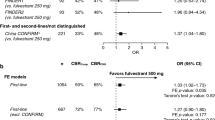Summary
There is a need for new endocrine agents that lack cross-resistance with currently available treatments to extend the endocrine treatment window and delay the need for cytotoxic chemotherapy. This retrospective analysis evaluated the response of postmenopausal patients with previously untreated metastatic/locally advanced breast cancer to further endocrine treatment following progression on first-line fulvestrant or tamoxifen. Patients received fulvestrant 250 mg (intramuscular injection every 28 days) plus matching tamoxifen placebo (once daily), or tamoxifen 20 mg (orally once daily) plus matching fulvestrant placebo (every 28 days) in a double-blind, randomized, phase III trial. Treatment continued until disease progression or withdrawal, when further endocrine therapy was initiated (at the treating physician’s discretion). Information regarding subsequent therapies and responses was obtained by follow-up questionnaire. Two-hundred-and-forty-five questionnaires were returned (from 587 patients), 149 of which yielded follow-up data on patients receiving second-line endocrine therapy following fulvestrant (n=83) and tamoxifen (n=66). Second-line therapy produced objective responses (OR) in 6/44 (13.6%) and clinical benefit (CB) in 25/44 (56.8%) patients who had CB with fulvestrant and produced OR in 5/41 (12.2%) patients and CB in 27/41 (65.8%) patients who had CB with first-line tamoxifen. For patients deriving no CB from trial therapy, second-line therapy produced OR in 3/39 (7.7%) and CB in 15/39 (38.5%) patients in the fulvestrant group and OR in 4/25 (16.0%) and CB in 12/25 (48.0%) patients in the tamoxifen group. Results from this questionnaire-based study suggest that postmenopausal women with advanced breast cancer who respond to first-line fulvestrant or tamoxifen retain sensitivity to subsequent endocrine therapy.
Similar content being viewed by others
References
InstitutionalAuthorNameEarly Breast Cancer Trialists’ Collaborative Group, (1998) ArticleTitleTamoxifen for early breast cancer: an overview of the randomised trials Lancet 351 1451–1467
AE Wakeling M Dukes J Bowler (1991) ArticleTitleA potent specific pure antiestrogen with clinical potential Cancer Res 51 3867–3873 Occurrence Handle1:CAS:528:DyaK3MXlvFyrtr4%3D Occurrence Handle1855205
JF Robertson RI Nicholson NJ Bundred E Anderson Z Rayter M Dowsett JN Fox JM Gee A Webster AE Wakeling C Morris M Dixon (2001) ArticleTitleComparison of the short-term biological␣effects of 7alpha-[9-(4,4,5,5,5-pentafluoropentylsulfinyl)-nonyl]estra-1,3,5, (10)-triene-3,17beta-diol (Faslodex) versus tamoxifen in postmenopausal women with primary breast cancer Cancer Res 61 6739–6746 Occurrence Handle1:CAS:528:DC%2BD3MXntFaisLw%3D Occurrence Handle11559545
A Howell JFR Robertson J Quaresma Albano A Aschermannova L Mauriac UR Kleeberg I Vergote B Erikstein A Webster C Morris (2002) ArticleTitleFulvestrant, formerly ICI 182,780, is as effective as anastrozole in postmenopausal women with advanced breast cancer progressing after prior endocrine treatment J Clin Oncol 20 3396–3403 Occurrence Handle1:CAS:528:DC%2BD38XntVyjsbs%3D Occurrence Handle12177099
CK Osborne J Pippen SE Jones LM Parker M Ellis S Come SZ Gertler JT May G Burton I Dimery A Webster C Morris R Elledge A Buzdar (2002) ArticleTitleDouble-blind, randomized trial comparing the efficacy and tolerability of fulvestrant versus anastrozole in postmenopausal women with advanced breast cancer progressing on prior endocrine therapy: results of a North American trial J␣Clin Oncol 20 3386–3395 Occurrence Handle1:CAS:528:DC%2BD38XntVyjsbo%3D Occurrence Handle12177098
J Pippen CK Osborne A Howell JFR Robertson (2003) ArticleTitleFulvestrant (Faslodex) versus anastrozole (Arimidex) for the treatment of advanced breast cancer: a prospective combined survival analysis of two multicenter trials Breast Cancer Res Treat 82 IssueIDSuppl 1 S101
A Howell JFR Robertson P Abram MR Lichinitser R Elledge E Bajetta T Watanabe C Morris A Webster I Dimery CK Osborne (2004) ArticleTitleComparison of fulvestrant v tamoxifen for the treatment of advanced breast cancer in postmenopausal women previously untreated with endocrine therapy: a multinational, double-blind, randomized trial J Clin Oncol 22 1605–1613 Occurrence Handle1:CAS:528:DC%2BD2cXpsVWmu7w%3D Occurrence Handle15117982
AU Buzdar W Jonat A Howell SE Jones CP Blomqvist CL Vogel W Eiermann JM Wolter M Steinberg A Webster D Lee (1998) ArticleTitleAnastrozole versus megestrol acetate in the treatment of postmenopausal women with advanced breast carcinoma: results of a survival update based on a combined analysis of data from two mature phase III trials. Arimidex Study Group Cancer 83 1142–1152 Occurrence Handle1:CAS:528:DyaK1cXmtlegsrs%3D Occurrence Handle9740079
S Kvinnsland G Anker LY Dirix J Bonneterre AM Prove N Wilking JP Lobelle O Mariani E Salle Particledi A Polli G Massimini (2000) ArticleTitleHigh activity and tolerability demonstrated for exemestane in postmenopausal women with metastatic breast cancer who had previously failed on tamoxifen treatment Eur J Cancer 36 976–982 Occurrence Handle1:CAS:528:DC%2BD3cXjsVCqsLw%3D Occurrence Handle10885600
I Vergote JFR Robertson U Kleeberg G Burton CK Osborne L Mauriac (2003) ArticleTitlePostmenopausal women who progress on fulvestrant (‘Faslodex’) remain sensitive to further endocrine therapy Breast Cancer Res Treat 79 207–211 Occurrence Handle1:CAS:528:DC%2BD3sXktV2qurg%3D Occurrence Handle12825855
L Perey B Thürlimann H Hawle H Bonnefoi J Ahern O Pagani A Goldhirsch D Dietrich (2002) ArticleTitleFulvestrant (’Faslodex’) as hormonal treatment in postmenopausal patients with advanced breast cancer progressing after treatment with tamoxifen and aromatase inhibitors Breast Cancer Res Treat 76 IssueIDSuppl 1 S72
G Steger R Bartsch C Wenzel U Pluschnig D Hussain RM Mader CC Zielinski (2003) ArticleTitleFulvestrant (Faslodex®) in metastatic breast cancer Breast Cancer Res Treat 82 IssueIDSuppl 1 S104
S Franco A Perez E Tan-Chiu C Frankel CL Vogel (2003) ArticleTitleFulvestrant (Faslodex®) demonstrates clinical benefit in heavily pretreated postmenopausal women with advanced breast cancer: a single-center experience Breast Cancer Res Treat 82 IssueIDSuppl 1 S105
Petruzelka L, Zimovjanova M: Fulvestrant in postmenopausal women with metastatic breast cancer progressing on prior endocrine therapy – results from an expanded access programme. Eur J Cancer (Suppl 2): 132, 2004 (abstract 264)
Author information
Authors and Affiliations
Corresponding author
Rights and permissions
About this article
Cite this article
Robertson, J., Howell, A., Gorbunova, V. et al. Sensitivity to further endocrine therapy is retained following progression on first-line fulvestrant. Breast Cancer Res Treat 92, 169–174 (2005). https://doi.org/10.1007/s10549-004-4776-0
Issue Date:
DOI: https://doi.org/10.1007/s10549-004-4776-0



